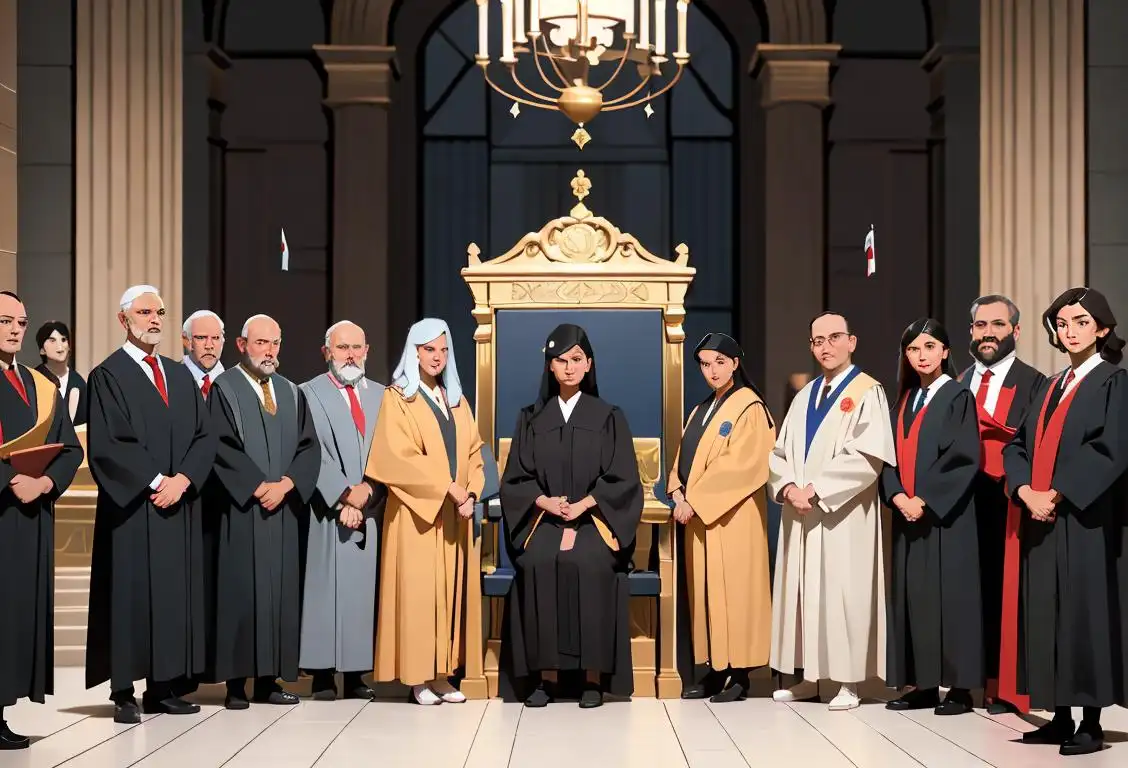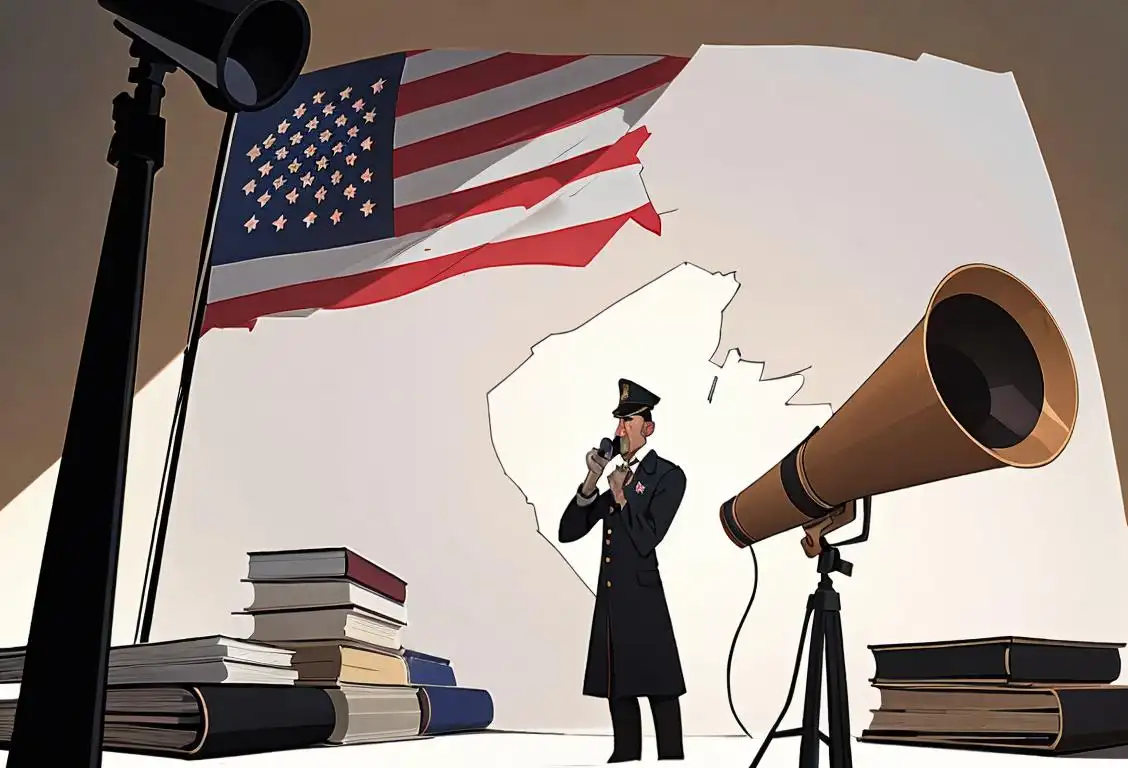National Justice Day

Happy National Justice Day! It's time to gather 'round and celebrate the noble pursuit of justice. Whether you're a fan of courtroom dramas or just appreciate the idea of fairness, this is a day for you. So, put on your judge's robes and grab your gavel as we dive into the fascinating world of justice!
When is Justice Day?
It's national justice day on the 17th July.
The Internet History of National Justice Day
Every year on July 17th, people across the internet come together to commemorate National Justice Day. This special day is dedicated to recognizing the importance of justice in our society and raising awareness about the struggles many face in their pursuit of fairness and equality.
While the origins of National Justice Day are not as widely known as some other national days, it has gained popularity in recent years thanks to social media and online communities. People from all walks of life take to the internet to share stories, quotes, and memes related to justice.
On this day, you'll find countless hashtags, such as #JusticeMatters and #FightForJustice, trending on Twitter and other social platforms. It's a great opportunity to engage in meaningful discussions and promote a better understanding of the importance of justice in our daily lives.
How to Celebrate National Justice Day
There are many ways you can celebrate National Justice Day, whether you're a legal expert or just someone who believes in the power of fairness.
One popular way to mark this day is by researching and sharing important court cases that have had a significant impact on society. From landmark civil rights cases to groundbreaking rulings, there's a wealth of knowledge to explore and discuss.
If you're feeling creative, why not organize a mock trial with your friends or colleagues? Channel your inner judge, prosecutor, or defense attorney and hold a friendly debate about a fictional case. It's a fun way to learn more about the legal system and how it works!
Did You Know?
Did you know that Lady Justice, the iconic symbol often seen in courthouses, is based on the Roman goddess Justitia? She is depicted blindfolded, holding scales, and carrying a sword. The blindfold represents impartiality, the scales represent the weighing of evidence, and the sword symbolizes the power of justice to cut through falsehoods.
History behind the term 'Justice'
4th Century BC
Origin in Ancient Greece
The term 'justice' finds its roots in Ancient Greece, specifically in the works of the famous philosopher Plato. Plato discussed justice extensively in his book 'The Republic,' where he defined it as the harmonious balance between the three elements of the soul: reason, spirit, and desire. This concept laid the foundation for the development of the term 'justice' in Western philosophy.
1180
Roman Legal Concept
The term 'justice' finds its roots in the Roman legal concept of 'iustitia,' which encompassed the principles of fairness, equity, and moral righteousness. It referred to the proper administration of the law in civil, criminal, and administrative contexts.
3000 BCE
Emergence of justice in ancient civilizations
In ancient civilizations such as Mesopotamia, Egypt, and India, the concept of justice began to take shape. It was during this time that written laws and codes were established to govern society. These early systems of justice aimed to maintain order and resolve disputes, often focusing on ensuring retribution and restoration of balance.
1250-1300
Etymology of 'Justice'
The term 'justice' originates from the Latin word 'justitia', which is derived from the Latin word 'justus', meaning 'just' or 'righteous.' It entered the English language through Old French, initially spelled as 'justise.' The concept of justice can be traced back to ancient Roman law and philosophy, where it represented moral righteousness and fairness.
1215
Magna Carta Establishes Fairness
In 1215, King John of England signed the Magna Carta, a document that played a crucial role in the development of modern justice systems. The Magna Carta introduced the idea that even the ruler should be subject to the law and established fundamental legal rights for individuals. This influential document laid the foundation for the concept of justice as we understand it today.
1215
The Magna Carta
In the year 1215, the Magna Carta was signed by King John of England, marking a significant moment in the evolution of justice. This document served as a precursor to the idea of justice as a fundamental right for all individuals. The Magna Carta established principles such as the prohibition of unlawful imprisonment and the guarantee of a fair trial, which are essential aspects of justice in modern legal systems.
510 BCE
Greek influence on justice
The ancient Greeks made significant contributions to the development of justice. They believed in the concept of an impartial judgment and established the agora, a public space where citizens could engage in discussions and participate in the decision-making process. The Greek philosopher Plato further explored the idea of justice in his work 'The Republic,' proposing a utopian society governed by wise philosopher-kings.
1215
Magna Carta and Legal Rights
In 1215, the Magna Carta was drafted and became a seminal document for the principle of justice. This historic charter established the idea that everyone, including the monarch, should be subject to the law. It granted legal rights and liberties to individuals, marking a significant step towards a more egalitarian society.
1789
French Revolution and Equality
The French Revolution of 1789 had a significant impact on the idea of justice. The revolutionaries adopted the motto 'Liberty, Equality, Fraternity,' emphasizing the importance of justice and equality for all citizens. The concept of justice became intertwined with the notion of social equality, challenging the existing societal hierarchies and promoting fairness and equal opportunity.
1776
Declaration of Independence
The Declaration of Independence, adopted in 1776, declared that all men are created equal and have the unalienable rights to life, liberty, and the pursuit of happiness. This document expressed the belief that justice should be a fundamental aspect of governance, ensuring the protection of individual freedoms.
1179 CE
Establishment of trial by jury
In the late 12th century, trial by jury emerged as a pivotal development in the evolution of justice. The signing of the Magna Carta in England in 1215 solidified the principle that individuals had the right to a fair trial by their peers. This marked a significant shift towards a more participatory and inclusive justice system.
1789
French Revolution and Declaration of the Rights of Man and Citizen
The French Revolution in 1789 brought about a profound transformation in the understanding and pursuit of justice. As part of this revolution, the Declaration of the Rights of Man and Citizen was adopted. The document emphasized the principles of liberty, equality, and fraternity, which are closely intertwined with the concept of justice. The French Revolution had a significant impact on shaping the modern understanding of justice and its importance in society.
1945
Establishment of the United Nations
In the aftermath of World War II, the United Nations (UN) was established in 1945 with the aim of promoting international cooperation and peace. The UN played a crucial role in the development of international law and justice, particularly through the creation of the International Court of Justice (ICJ). The ICJ serves as the principal judicial organ of the UN and contributes to the resolution of disputes between countries based on principles of fairness and justice.
1648 CE
Treaty of Westphalia and international justice
The Treaty of Westphalia, signed in 1648, marked a critical turning point in the recognition of international justice. This agreement ended the Thirty Years' War and introduced the principle of state sovereignty. It established the foundation for modern international law, where justice between nations became a significant consideration in maintaining global order.
1945
Nuremberg Trials and International Justice
Following World War II, the Nuremberg Trials held between 1945 and 1946 marked a pivotal moment for international justice. The trials prosecuted major Nazi war criminals, establishing the principle that individuals could be held accountable for crimes against humanity. This landmark event contributed to the development of international legal frameworks, such as the establishment of the International Criminal Court, aiming to ensure justice on a global scale.
1945
Universal Declaration of Human Rights
After World War II, in 1945, the United Nations adopted the Universal Declaration of Human Rights. This international agreement outlined the fundamental rights and freedoms to which all individuals are entitled, emphasizing the universality of justice, equality, and non-discrimination.
1955
Civil Rights Movement and Racial Justice
The American Civil Rights Movement that emerged in the mid-1950s fought for racial justice and equality in the United States. Led by influential figures like Martin Luther King Jr., this movement aimed to address racial discrimination, segregation, and systemic injustice. The struggle for civil rights raised awareness about the importance of justice in combating inequality based on race, inspiring similar movements around the world.
1954
Civil Rights Movement
The Civil Rights Movement, gaining significant momentum in the mid-1950s, sought justice and equality for African Americans in the United States. Leaders like Martin Luther King Jr. advocated for nonviolent protests and challenged systemic racial injustice, playing a pivotal role in shaping the modern understanding of justice.
1945 CE
Establishment of the United Nations
The establishment of the United Nations (UN) in 1945 brought a renewed focus on global justice. The UN Charter aimed to promote peace, security, and human rights worldwide. It provided a platform for member states to address international disputes and strive for justice on a global scale. The Universal Declaration of Human Rights, adopted by the UN in 1948, further emphasized the importance of justice for all individuals.
1948
Universal Declaration of Human Rights
The Universal Declaration of Human Rights, adopted by the United Nations General Assembly in 1948, further solidified the concept of justice on a global scale. The declaration states that all individuals are entitled to basic rights and freedoms, regardless of their nationality, race, or gender. It encompasses various aspects of justice, including the right to a fair trial, equality before the law, and protection against discrimination. The Universal Declaration of Human Rights continues to serve as a cornerstone for promoting justice and human dignity worldwide.
21st Century
Advancements in digital justice
With the advent of the internet and digital technologies, the concept of justice has undergone further transformations. Online platforms have led to the rise of cybercrime, prompting the development of digital justice systems. Additionally, advancements in forensic sciences have played a crucial role in delivering more accurate and fair outcomes in criminal cases. The pursuit of justice continues to evolve in the dynamic landscape of the 21st century.
1998
International Criminal Court
In 1998, the Rome Statute established the International Criminal Court (ICC) as a permanent tribunal for prosecuting individuals responsible for war crimes, genocide, and crimes against humanity. The ICC became a significant pillar of global justice and a symbol of international cooperation in holding perpetrators accountable.
Did you know?
Did you know that Lady Justice, the iconic symbol often seen in courthouses, is based on the Roman goddess Justitia? She is depicted blindfolded, holding scales, and carrying a sword. The blindfold represents impartiality, the scales represent the weighing of evidence, and the sword symbolizes the power of justice to cut through falsehoods.Tagged
awareness fun justiceFirst identified
8th January 2016Most mentioned on
17th July 2020Total mentions
27Other days
Law Day
Whistleblower Day
Justice Day
Former Prisoner Of War Recognition Day
Heroes Day
Memorial Day
Handloom Day
Bestfriends Day
Liberation Day
Dance Day








